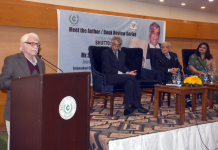ISLAMABAD, OCT 2: The Supreme Court on Wednesday rejected the Pakistan Tehreek-e-Insaf’s (PTI) objection to the constitution of the bench hearing the review plea against the Article 63(A) verdict and directed the federal government to arrange a meeting between incarcerated ex-prime minister Imran Khan and party lawyer Ali Zafar.
“Arrangements should be made for a meeting between Barrister [Ali] Zafar and the PTI founder,” Chief Justice of Pakistan (CJP) Qazi Faez Isa said while directing the attorney general to facilitate the said meeting.
The development comes as a CJP-led five-member bench comprising Justice Amin-ud-Din Khan, Justice Jamal Khan Mandokhail, Justice Mazhar Alam Khan Miankhel and Justice Naeem Akhtar Afghan is heard the Supreme Court Bar Association’s (SCBA) petition challenging the apex court’s previous ruling on the defection clause.
Play Video
The new bench was constituted a day earlier due to Justice Munib Akhtar’s “unavailability” for varying reasons.
The lawyer’s body had moved the apex court against its May 2022 verdict wherein it declared that the votes of dissident members of Parliament (MPs), cast against their parliamentary party’s directives, cannot be counted.
During today’s hearing, PTI lawyer Barrister Zafar argued that the party’s founder, who is also a former prime minister, is one of the petitioners, and he needed to consult him on key aspects of the case.
“Please allow me to consult with the PTI founder regarding this matter,” the lawyer requested, explaining the necessity of discussing legal points with his client.
In response, the chief justice noted that the counsel should have raised this request during yesterday’s proceedings, as the court could have issued an order for the consultation at that time.
Nevertheless, the Supreme Court approved Barrister Zafar’s request, allowing him to meet with the incarcerated party leader, who is currently being held in Adiala Jail.
Defection clause saga
The issue at hand owes its origins to a reference filed by the Pakistan Tehreek-e-Insaf (PTI) government in the SC back in 2022 seeking the apex court’s opinion on Article 63(A) to curbing the menace of defections, purification of the electoral process, and democratic accountability.
The court, via a 3-2 judgement, had then announced the verdict against defections and barred lawmakers from going against their party’s policy lines when voting in the parliament.
Three judges — then-CJP Umar Ata Bandial, Justice Ijazul Ahsan, and Justice Munib had voted in favour whereas Justice Mandokhail and Justice Mazhar disagreed with the verdict.
The SCBA filed a plea moving the apex court to take back its opinion on the verdict’s paragraph about not counting the votes of dissidents by reviewing the interpretation made on May 17, 2022. It maintained that the dissidents should only be de-seated but their votes are supposed to be counted as per the Constitution of Pakistan.
“The apex court’s opinion about not counting the dissident’s votes is against the Constitution and equal to interference in it,” the SCBA stated in the plea.
What is Art 63(A)?
Article 63(A) of the Constitution of Pakistan deals with the defection of parliamentarians.
According to the article, a lawmaker can be disqualified on the grounds of defection if they vote or abstain from voting in the House contrary to any direction issued by the parliamentary party to which they belong.
However, this is restricted to three instances where they have to follow the party’s directions:
Election of the prime minister or chief minister;
Vote of confidence or a vote of no-confidence;
Money bill or a Constitution (amendment) bill.
Per the article, the head of the party is required to present a written declaration that the MNA concerned has defected.
However, prior to presenting the declaration, the head of the party will have to give the MNA concerned a chance to explain the reasons for defection.
Following that, the party chief will then forward the written declaration to the speaker, who would, in turn, hand it over to the chief election commissioner (CEC).
The CEC will have 30 days at their disposal to confirm the declaration. Once confirmed, the MNA concerned will no longer be a member of the House and their “seat shall become vacant”.

















